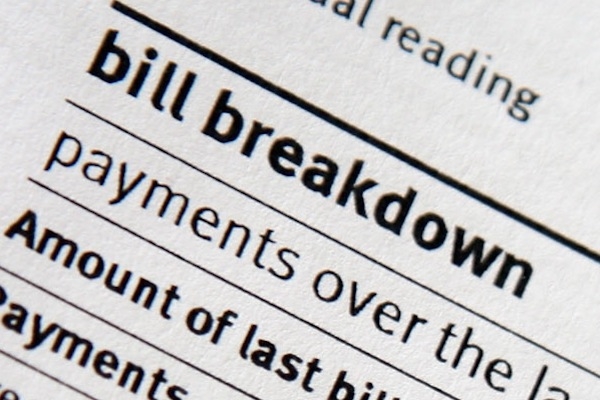Like many households, my electricity meter is not in a terribly accessible spot. Reaching said meter requires a short stepladder or standing on the kitchen counter. That said, there’s no need for crampons.
And so every time someone comes to read the meter, I’m met with the same response. ‘Oh no lass, health and safety. I can’t get up there.’ Needless to say, the meter goes unread.
As a result, and also because I pay by direct debit, I’m one of many whose bills are, for the most part, based on estimations (yes, I know I could send in a reading myself but at some point the lekky company really should do it). Once the meter is finally read, this can result in ‘back-bills’. Also known as ‘catch-up’ bills, they enable the energy company to recover the difference. It’s not surprising that this can sometimes result in large amounts being owed.
According to Citizens Advice, the shortfall behind payments already made and the actual amount of energy used is, on average, £206. It also says that last year as many as 2.1 million consumers received some kind of catch-up bill. In a number of cases, back-bills reached thousands of pounds.
Cash-strapped households can do without unexpected energy bills. They are already struggling with above-inflation rises, something the government seems powerless to prevent. In fact, Scottish Power customers have just seen their standard dual-fuel bill increase by an average of £86 a year. Npower dual-fuel bills have risen by 9.8 per cent, leaving some customers £110 worse off, and Co-op Energy dual-fuel customers face price hikes of about £58 a year. Meanwhile, British Gas is the sole big energy provider not to have announced price rises – yet.
As for back-bills, Ofgem has stepped in. Under the regulator’s proposals, energy firms will be banned from charging for gas and electricity used more than 12 months earlier. The clampdown comes ten years after suppliers signed a voluntary commitment not to back-bill customers for energy used more than a year ago. However, case studies from Citizens Advice suggested the rule was not being applied consistently and also that a number of firms were refusing to help customers with large back-bills.
Rachel Fletcher, senior partner at Ofgem, said: ‘Getting billing right is an essential part of customer service, but when things go wrong we want to ensure that all customers benefit from the same protection against back-billing. We cannot be certain that this is the case now under the voluntary commitment. We expect suppliers to put their customers first, which is why we are proposing a new enforceable rule to provide this protection.’
Emma Bush, energy expert at uSwitch, said over a quarter of households regularly face large charges out of the blue due to estimated meter readings.
‘Putting an end to back-billing on energy used more than a year ago will help protect consumers and encourage suppliers to do more to ensure bills are accurate in the first place. We would also encourage consumers to do their part by submitting meter readings every three months.’
Ofgem expects the new rules to be implemented this winter. Given the health and safety concerns over climbing three steps up a ladder, I’d better go and read my meter now.
Helen Nugent is Online Money Editor of The Spectator






Comments